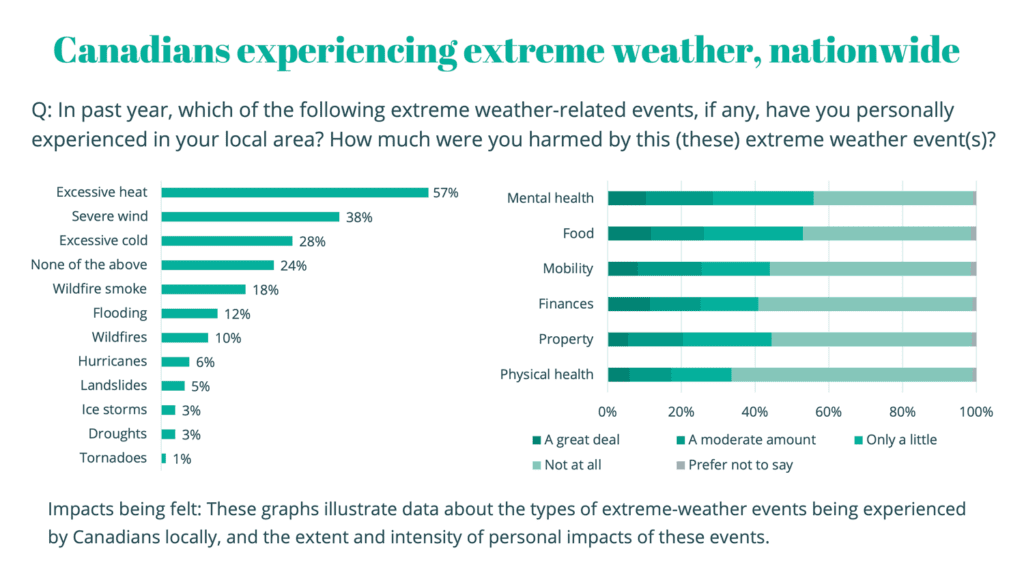FOR IMMEDIATE RELEASE
VANCOUVER (FEB.8, 2023): Three out of four Canadians say they experienced extreme weather-related events last year, often with negative personal impacts, and 72% want more climate action by government, up 10% from last year, according to a large national survey conducted for EcoAnalytics by researchers at the Université de Montréal in late fall.
Asked what sort of extreme weather they’d seen, 57% said extreme heat, followed by severe wind (38%), excessive cold (28%), wildfire smoke (18%), and flooding (12%), among other types.
About a third of those who’d experienced impacts said these affected their mental health “a great deal” or “moderate amount”. This included 32% of BC residents (13% of whom answered “a great deal”), and, respectively, 39% of people who identified as being from a visible minority (18% “a great deal”) and 40% of those in financial difficulty (17% “a great deal”). One in four who’d experienced impacts said these included shortages of food, reduced mobility and/or finance costs. (See graphs on next page)
On climate action, 40% said they want governments to do “a lot more”, and 32% “somewhat more.” Quebecers were most supportive of more action on climate action (85%) and biodiversity loss (89%).
The survey was conducted for EcoAnalytics, Nov. 25 to Dec. 2, 2022, by Erick Lachapelle, Professor of Political Science at UdeM. A total of 1,860 Canadians participated, including an oversample from Atlantic Canada. This allowed the research to analyse the local effects on opinion of Hurricane Fiona, as well as in five other regions: Quebec, Ontario, Manitoba and Saskatchewan, Alberta and BC.
Asked about their experience of changing weather patterns, differences across sub-groups were striking. Residents of coastal provinces were most likely to say they had seen significant weather changes, including 73% of British Columbians and 78% of PEI residents. This compared with 56% of Ontario and Manitoba residents and 42% of Alberta residents. People’s perception of their experience with extreme weather also varied significantly across age, gender and political views. For instance, those answering affirmatively included 63% of younger Canadians (18-24) and 62% of respondents over 65, (but only 55% of respondents 35-54), 64% of women compared to 47% of men, and 73% of those on the political left (compared to only 41% on the right). About 65% said the changes in weather patterns they had witnessed were negative.
The wide-ranging survey is the latest in a series conducted by Dr. Lachapelle which tracks changes in opinion since 2011. Like other national polls, it found that climate change has been eclipsed by cost of living and inflation and health concerns in the last year as respondents’ most important concern.
“The relationship between extreme weather and climate change is complex, as is the way in which the public interprets the linkages,” said Lachapelle. “Many are being exposed to extreme weather and most attribute some role to climate change, but people’s political and worldviews can either amplify or dampen the effect of climate change signals as a call to action.”
EcoAnalytics Research Initiative is a non-profit project of MakeWay Charitable Society that conducts market research on behalf of 14 influential Canadian environmental organizations, including the David Suzuki Foundation, Greenpeace, Nature Canada and WWF-Canada.
View tabulated results, slides summary and full-size infographic
For more information, please contact:
James Boothroyd, EcoAnalytics Project Director, 604-315-4246,

